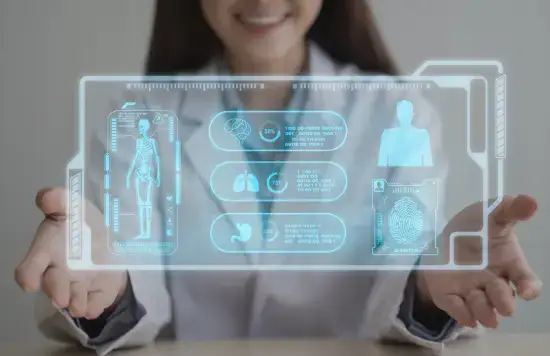
The Future Is Healthy: 2024’s Game-Changing GenAI Innovations
GenAI is redefining healthcare, turning data into smarter, faster, and more personalized patient care.


Generative AI is transforming healthcare, enabling faster, smarter, and more personalized care while keeping human judgment at the center.
Summary: Generative AI is revolutionizing healthcare — from precision medicine and accelerated drug discovery to virtual surgical planning — enabling smarter, faster, and more personalized patient care.
Yet, as technology advances, maintaining ethics, empathy, and human judgment remains essential to truly healing lives.
The year 2024 marks a defining chapter for the healthcare industry, as digital innovation and Generative AI converge to reshape how care is delivered, data is managed, and patient outcomes are achieved. While artificial intelligence has long been a catalyst for change in healthcare, the rise of Generative AI — capable of producing entirely new insights, content, and solutions — is unlocking a new dimension of potential.
Yet, as organizations move from experimentation to real-world adoption, the journey demands caution and responsibility. Upholding ethical standards, safeguarding data privacy and patient consent, mitigating biases in AI models, and ensuring seamless interoperability will be essential to realizing GenAI’s promise safely and sustainably.
Here’s a closer look at the key Generative AI trends our experts believe will redefine healthcare and life sciences in 2024 and beyond.
In 2024, Generative AI is revolutionizing personalized care by analyzing a patient’s genetic makeup, medical history, and lifestyle to predict disease risks and tailor treatments.
With Next Generation Sequencing (NGS) enabling simultaneous analysis of millions of DNA fragments, clinicians can match patients to targeted therapies more efficiently.
When integrated with EHR systems, these insights empower providers to prevent chronic diseases, reduce adverse drug reactions, and deliver precision care that improves outcomes while lowering costs.
Generative AI is transforming drug discovery by rapidly analyzing chemical and biological data to predict viable compounds and simulate their effects on the human body.
Pharma giants like Pfizer have already demonstrated success, achieving a 21% clinical success rate through AI-powered development.
With 90% of BioPharma and MedTech leaders expecting GenAI to reshape R&D in 2024, ensuring interoperability across research platforms will be key to faster collaboration and delivering breakthrough treatments sooner.
Generative AI is redefining surgery by enabling virtual rehearsals on digital twins of patients before entering the operating room.
By creating lifelike 3D organ and tissue models, surgeons can simulate complex procedures, refine techniques, and anticipate challenges in advance.